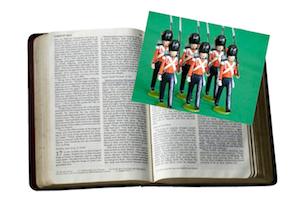 It should be obvious to anyone and everyone by now that I’ve bitten off more than I can chew in this whole endeavor of walking through the Bible gathering insights about war and violence. Nowhere will that be so apparent as in my analysis of the prophets.
It should be obvious to anyone and everyone by now that I’ve bitten off more than I can chew in this whole endeavor of walking through the Bible gathering insights about war and violence. Nowhere will that be so apparent as in my analysis of the prophets.
The Old Testament prophets lived during the time of the divided kingdom. War was a constant reality for God’s people, usually an ugly reality. Because of their lack of trust in Him, God punished the descendants of Israel through foreign invaders. The prophets make it clear time and again that it is God’s will that these foreigners oppress His people (Isaiah 10:5-6, 22:1-8, 28:1-22, 29:1-4, 30:8-17, Amos 3:1-2, 5:18-20). The prophets don’t call for the Israelites to arm themselves and throw off these invaders; they call for the Israelites to return to God. Would they then be called to take up arms in defense of their people? That question goes unanswered. The key is that they get God to fight for them.
God is seen at times as a warrior God, leading the hosts of heaven against His enemies. (Joel 3:9-11, for example) The understanding is that one day He will march against His enemies. For now He uses earthly armies, both human and insect (see the imagery in Joel of the locust invasion).
The prophets foresee a day when war will be no more (Isaiah 2:2-4; Micah 4:1-3; Hosea 2:18; Zechariah 9:10). God will destroy all weapons and declare peace throughout the world.
What other themes relative to our discussion can you think of that come out in the Old Testament prophets?
